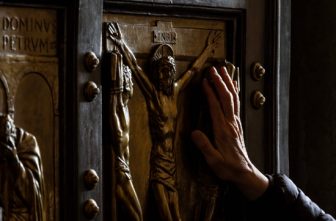
Last month, we started to look at some of the Catholic Worker’s critique of the modern social order.
We focused especially on what happens when creative work becomes displaced from its role as one of the main unifying centers of life. We are starting to see at this point that the Worker’s critique comes from the perspective of life on the land, and that the ills it diagnoses are primarily results of breakup of a land-based economy. It is an agrarian vision directed against key features of industrialism.
We might be able to dismiss this as a quaint, idyllic fantasy, distracting us from the real world, if it weren’t for the fact that this agrarianism was plainly the beating heart of Catholic social teaching in encyclicals like Rerum Novarum and Quadragesimo Anno. For Dorothy Day and Peter Maurin, as well as for the popes, the ultimate solutions to our modern maladies can only come by rediscovering a social order where most of us have more intimate connections with the land. Without this peace, any movements for justice and peace are just rearranging the deck chairs on the Titanic.
One of the most problematic aspects of industrializing the world is the social fragmentation it has produced. Previous columns have illustrated the way that strong communities are held together by the social bonds created by the local production of the necessities of life. But it is the very nature of the industrial/consumer economy that it has progressively taken the means of such production out of the hands of local communities and placed it in the hands of large, external organizations and institutions. Food, medicine, childcare, transportation, employment, entertainment, education, clothing, eldercare and housing are provided almost exclusively from outside of families, neighborhoods, towns and parishes.
This is a monumental social change, for it amounts to the outsourcing or externalizing of a community’s social bonds. It amounts, really, to the destruction of the social bonds, and to the practical destruction of local communities. For real communities have never been just people who live near each other, but people who take care of the business of life together. But when we are all consumers, rather than producers, we cease to need one another and share little more than geographical vicinity. We are strangers in our own neighborhoods. We no longer need one another, we need Amazon, banks, Target, health care, big oil, social workers and auto service centers. As we know each other less, fear and suspicion increases, loneliness mounts, we become more isolated, children grow up playing inside, and our phones become our best friends.
We lose our sense of independence. In a local economy, we can rest relatively secure, confident in our ability to make ends meet, regardless of what happens in the wider world. But we are now dependent for most of the practical things that make life go around on those large impersonal institutions and corporations that have radically monopolized the production of goods and services.
As this happens, our personal identity inevitably shifts, because our “community” shifts. Today we increasingly become less members of concrete, tangible, visible communities sharing the tasks of living together — extended families, neighborhoods or parishes — and more members of invisible bureaucracies and legal entities that apply everywhere but exist nowhere. Our flesh and blood histories and relations cease to matter, and we are abstracted into case numbers and policy holders and account profiles. Being such a number is increasingly what it means to be a “member of a community.” As a good Minnesotan I am not prone to hyperbole, but by any estimation of the situation, this is not a pretty picture.
In future columns, I’ll spell out the implications of this “radical monopoly” more fully and begin to suggest some things the Church can do now to actively regain some independence and community life. But it may be worth pointing out before closing that the sort of critique I have been making — following here both the Catholic Worker and the popes’ social encyclicals — is not one that is easily categorizable on our current socio-political spectrum. It is neither the “conservative” argument that government and institutions are curtailing our economic freedom, nor the “liberal” argument that reform of institutions is necessary to fix a broken system. It is the Catholic argument that community, local dependence and local economy are the only alternatives to social atomization.
Miller is the director of the Center for Catholic Social Thought at Assumption in St. Paul. He is the author of “We Are Only Saved Together: Living the Revolutionary Vision of Dorothy Day and the Catholic Worker Movement,” published by Ave Maria Press.




